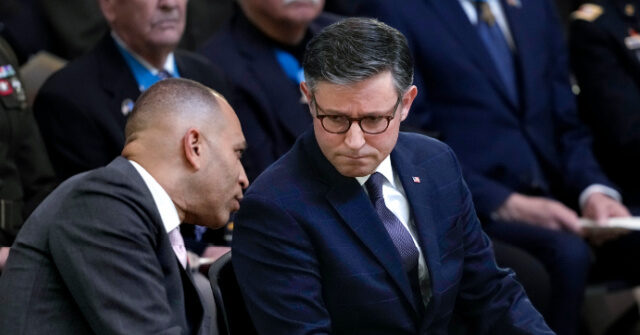In a recent discussion about House Speaker Mike Johnson’s viability in maintaining his position, Senator Mitt Romney suggested that Johnson’s best chance relies on obtaining support from House Democrats. This would necessitate a cooperation agreement with House Minority Leader Hakeem Jeffries, who would likely demand concessions in exchange for Democratic votes. Such an arrangement may pose conflicts for Johnson, particularly regarding the expectations set forth by President-elect Donald Trump. Following his decisive election win, Trump aims to pursue his own policy agenda, diverging from that of Jeffries or establishment Republicans, which could create tensions within the party and affect Johnson’s leadership stability.
Ramifications of a potential power-sharing agreement could complicate Johnson’s role further. Romney expressed doubt that Democrats would aim to disrupt the House’s functionality entirely, suggesting they might be prudent enough to support Johnson in a bid for stability. However, this dynamic puts Johnson in a precarious position, where securing Democratic votes implies a departure from Trump’s agenda and might lead to backlash from the Republican base. If Johnson opts for this route to retain his Speakership, he may face significant criticism for not adhering to the mandate provided by Trump’s supporters, which could threaten Republican unity.
Currently, Johnson’s situation requires him to navigate a delicate balance. He can only afford to lose one Republican vote while needing Democrat support to secure the Speakership, yet reports indicate up to 25 House Republicans might oppose him. The fragility of Johnson’s support further complicates the matter, as he must consider the implications of either aligning with Democrats or risking his position altogether. The internal struggles within the GOP showcase a fracture that could undermine Johnson’s authority and effectiveness as Speaker, leaving him with limited breathing room as January 3—the date of the Speakership election—approaches.
Moreover, there are indications that Trump’s confidence in Johnson may be waning. As of last Thursday, Trump began signaling uncertainty about Johnson’s ability to hold onto the Speakership, leading to speculation that Trump might be orchestrating a push for new leadership among House Republicans. Such a shift would underscore the tenuous nature of Johnson’s position and the pressures he faces from both Trump loyalists and moderate Republicans. The potential discord within the party, fueled by rumors of Trump’s calculated maneuvers, could jeopardize Johnson’s chances of effectively leading the House should he manage to remain Speaker.
As these dynamics unfold, the electoral strategies will become increasingly pertinent leading up to the upcoming vote. The split between Trump’s agenda and potential bipartisan cooperation in the House raises critical questions about the future of Republican leadership and governance at large. Should Johnson choose to engage with Democrats for support, he risks alienating a section of his party that rallied behind Trump’s vision. Conversely, refusing any collaboration may lead to his downfall given the number of opposing Republican votes he faces. Balancing these competing interests will define Johnson’s tenure and the House’s legislative direction for the foreseeable future.
In summary, Johnson’s Speakership is under significant scrutiny, driven by internal GOP conflicts and external pressures from Democratic leadership. As he contemplates aligning with Democrats for support, he must weigh the consequences carefully to avoid alienating Trump’s base. With the upcoming election set for January 3, the stakes are high as the party grapples with its identity, the influence of Trump’s legacy, and the need for effective governance. Johnson’s ability to navigate this complex political landscape will not only determine his own future as Speaker but also set the tone for the legislative agenda moving forward.

